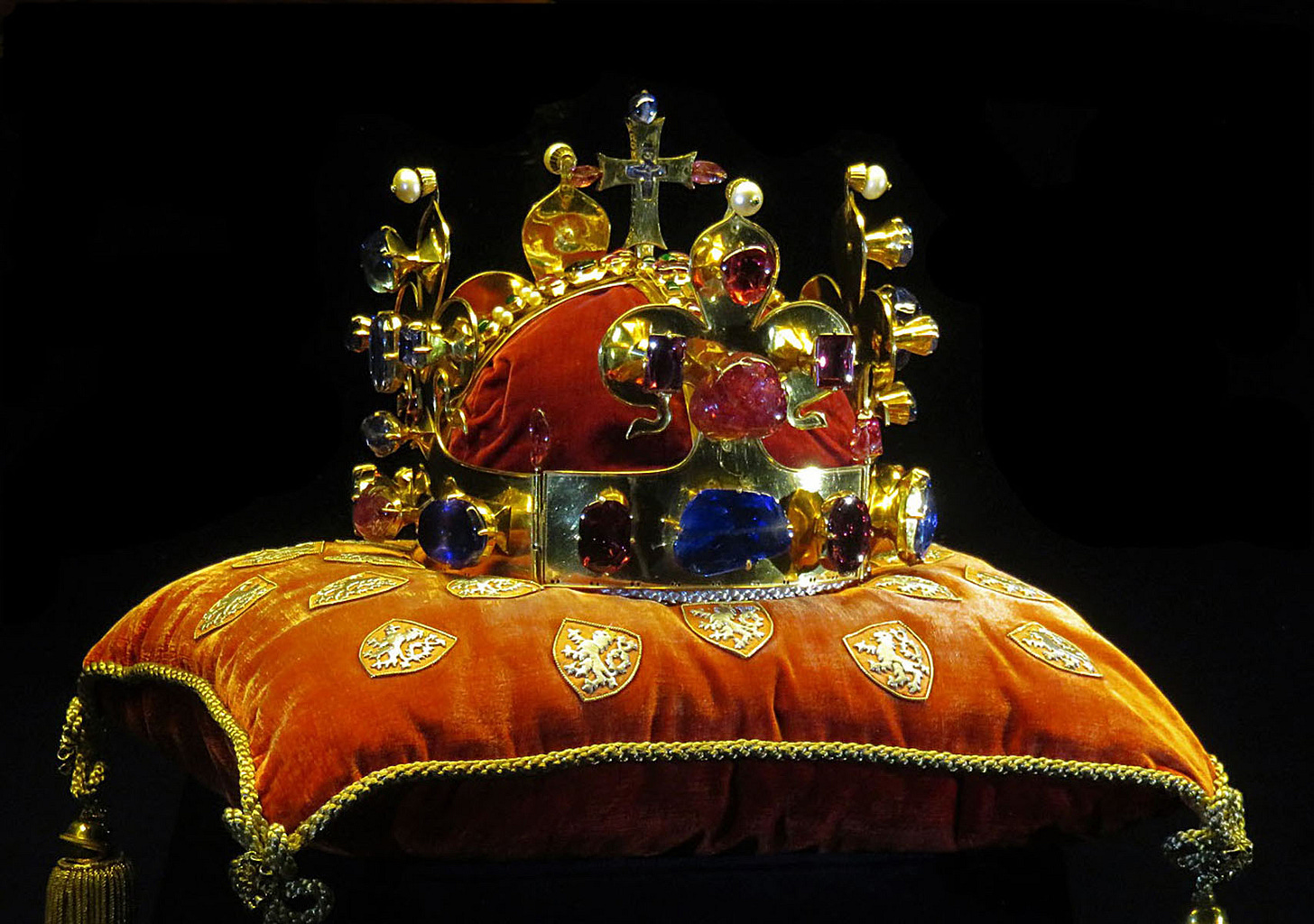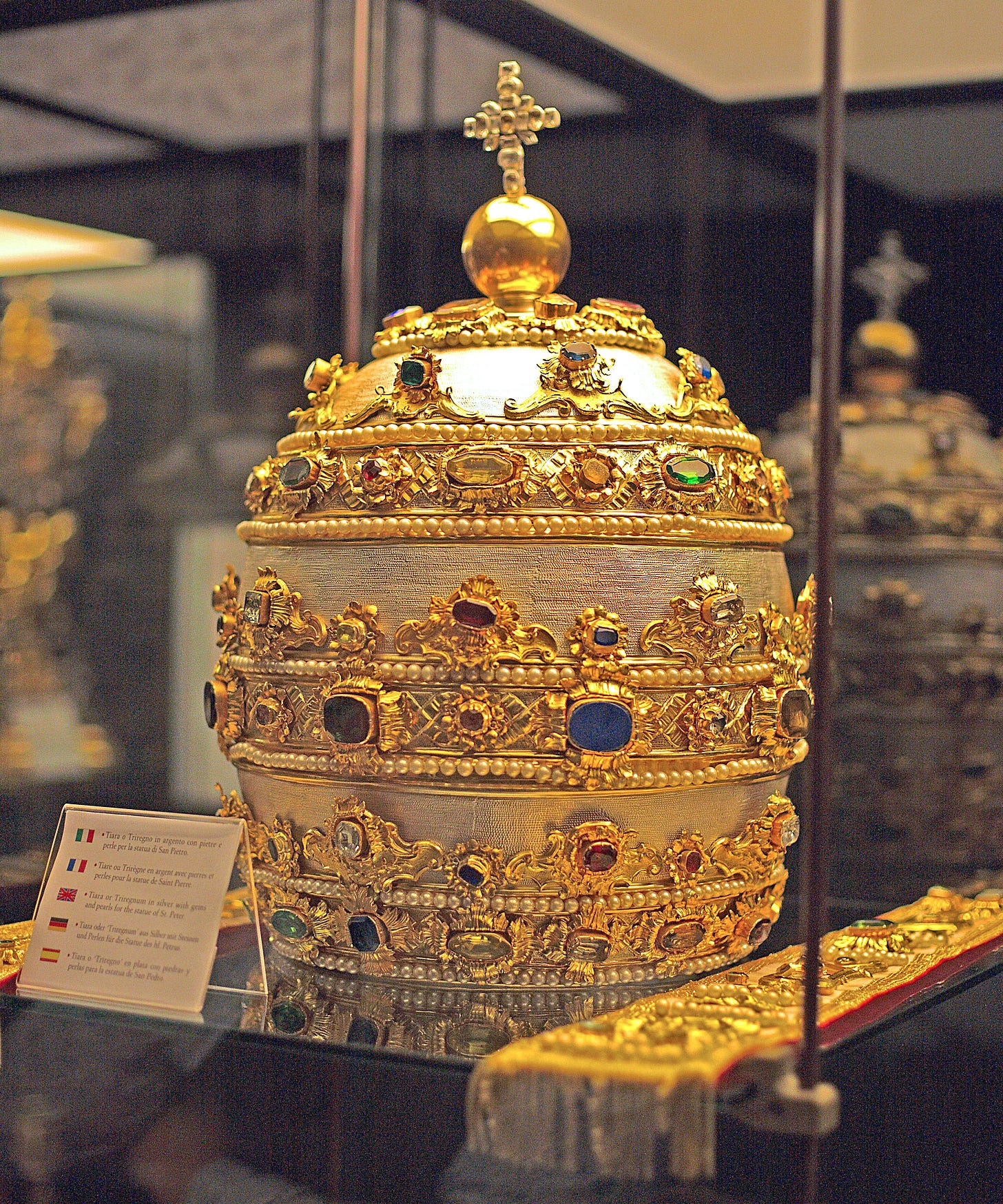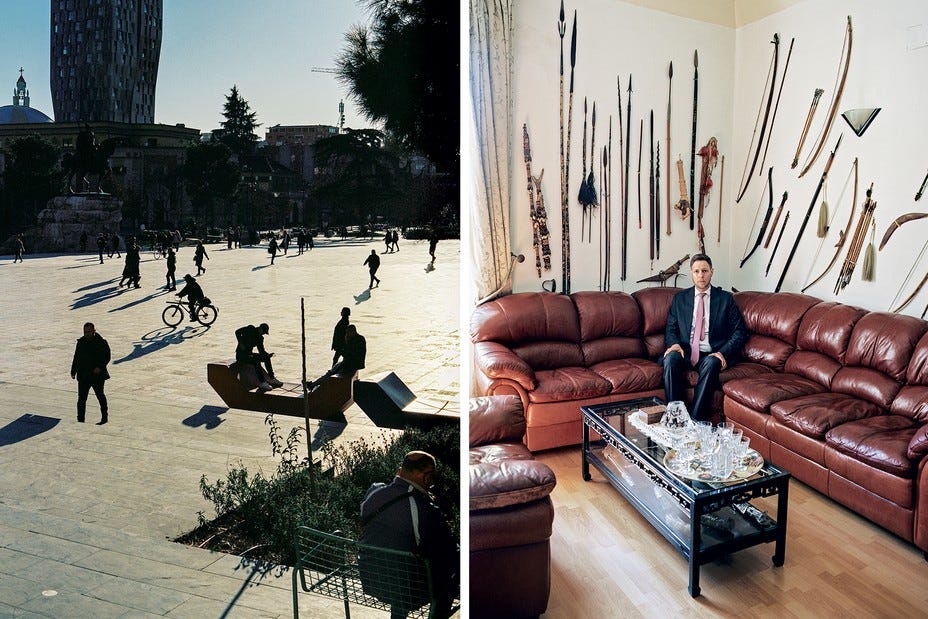Happy . . . non-Friday!
I’m writing to let you know that my first reported feature for the Atlantic magazine has just gone live. The print headline was “The Shadow Royals” and it’s been more than six months in the making.
Leka is a paradox—a royal prince living in a democratic republic. His position is lonely, as the only son of an only son. He has assigned himself an immense task: to act as a unifying figure in a poor country with a febrile political system still scarred by half a century of authoritarianism, in a region marked by religious violence. And the tools available to him are few: a resonant name, a gentle manner, and a handful of social-media accounts. Leka is active on Facebook and Instagram, and occasionally drops into Twitter, where his unverified account promises to share a “combination of personal and official happenings.”
Across Europe, royal families are variously seen as tourist attractions, embarrassing artifacts, spiritual leaders, and symbols of national identity. Several countries that exiled their monarchs in favor of fascism, communism, or military rule—Greece, Serbia, Romania, Bulgaria, and of course Albania—have now allowed their royal families back home, making uneasy pacts with history. They are royal but not royal, monarchs without thrones, caught between the past and the future. A surprising number of them have gone into politics. What do their countries want from them?
I thought that since I’ve been working on this article for so long, and because I am a complete royal history nerd, I would offer some behind-the-scenes insight and some DVD extras.
The story began last summer when, in a Slack discussion about the British monarchy, I casually mentioned that my dream project was to tour Europe talking to its deposed royal families. One of our senior editors, Yoni, said: why not, though? So I began emailing dispossessed aristocrats to see who would agree to talk to me. This turned out to be more straightforward than I expected, because a) it’s the 2020s, everyone has a website; b) dispossessed European royals usually speak great English, on account of having gone into exile in the UK/US/South Africa. (Crown Prince Alexander of Serbia, who was allowed to return to the Balkans in 2000, was born in July 1945 in Claridge’s. The Queen is one of his godparents.)
Then I started researching monarchist groups. I was fascinated to talk to people who, 50 or 100 or 250 years after their country kicked out its monarch, were hankering to have them back. Very little of this material made the finished piece, but I am still incredibly taken with the story of how a group of Czech monarchists had a silver replica of the Wenceslas crown made to give to the (non)King of Bohemia.

The “rightful” king of Bohemia is now known as Karl von Habsburg. He would have been emperor of Austro-Hungary had the twentieth-century not intervened; instead he’s had to make do with being an MEP.
Now, I’m the kind of history nerd who reads books about the Habsburgs in their spare time—this one is very comprehensive—but my favourite defunct European royal family is, of course, the French one. Not least because, in classic French fashion, there are three competing complaints for the French throne. One of them is actually Spanish, and—demonstrating the kind of awkward relationships that hereditary power leaves you with—is both a great-grandson of King Alfonso XIII of Spain and the great-grandson of General Franco, the dictator who replaced the king.
Bonus material #1: Simeon Saxe-Coburg-Gotha (yes, the same name our royal family used to have, until the First World War) was allowed back to Bulgaria in 1996 after being dethroned as a six-year-old child. Then he became Bulgaria’s prime minister. He is the only hereditary ruler that I can think of who later became a country’s elected leader.
I also wonder if Simeon’s kids were the inspiration for Kris Jenner, as they are called Kardam, Kyril, Kubrat, Konstantin-Assen and Kalina.
Bonus material #2: John William Friso is the most recent common ancestor of all the remaining hereditary monarchs of Europe. (He was Prince of Orange in the 18th century.) Luv 2 b closely related to my peers. Unless they carry the gene for haemophilia or big jaws.
Occasionally, someone asks me why I don’t jump ship to Substack and become a Professional Contrarian for $$$. This piece is the answer. Having the institutional support of the Atlantic meant that a photographer, Jelka von Langen, went to Tirana to photograph Crown Prince Leka II; several editors gave me feedback on how to shape and refine the piece; specialists in layout and art direction made it look beautiful for for the print edition, and now it will have SEO and social promotion for its online publication. It was also fact-checked by a tag team of error-hunters (thank you Will, Isabel and Amy) who picked up all kinds of small discrepancies.
One small example: I did not know, until fact-checking this piece, that the Vatican is a monarchy. The world’s only elective ecclesiastical absolute monarchy, in fact.
The Pope is a monarch!
Bonus material #3: I spent quite a long time deciding which of Otto von Habsburg’s many titles to cite. He was (per Wikipedia): Emperor of Austria; Apostolic King of Hungary, King of Bohemia, Dalmatia, Croatia, Slavonia, Galicia and Lodomeria; King of Jerusalem etc.; Archduke of Austria; Grand Duke of Tuscany and Cracow; Duke of Lorraine, Salzburg, Styria, Carinthia, Carniola and Bukowina; Grand Prince of Transylvania, Margrave of Moravia; Duke of Silesia, Modena, Parma, Piacenza, Guastalla, Auschwitz and Zator, Teschen, Friuli, Dubrovnik and Zadar; Princely Count of Habsburg and Tyrol, of Kyburg, Gorizia and Gradisca; Prince of Trent and Brixen; Margrave of Upper and Lower Lusatia and Istria; Count of Hohenems, Feldkirch, Bregenz, Sonnenburg etc.; Lord of Trieste, Kotor and the Windic March, and Grand Voivod of the Voivodeship of Serbia.
(tag urself I’m “grand prince of transylvania”)
What’s a voivod, you might ask? It’s a central European warlord. Dracula was one.
One of the inspirations for this piece was Norman Davies’s book, Vanished Kingdoms, which is subtitled “the history of half-forgotten Europe”. Davies argues that we project our current ideas of geography backwards, and this can obscure the history of a continent which was once Burgundy and Navarre, rather than “France”. That book includes Carpatho-Ukraine, a country which lasted for all of six months in the late 1930s.
Although the United Kingdom itself has a disputed border in northern Ireland, living in London means it can still be easy to forget how fluid the map of Europe was throughout the 19th and 20th centuries.
That was one of the reasons I was glad to report from Albania, which is surrounded by unstable, fractured states. Tirana’s airport is named after Mother Theresa: except she was born in Skopje, which is now in North Macedonia.
A king implies a kingdom, and that means something particular in the Balkans, a region which has seen so much upheaval in the last 30 years. Leka’s deposed grandfather King Zog was, as I say in the piece, both charming and utterly ruthless—but without him, Albania might not exist in the form it does today.
My Atlantic piece is also a story about communism, which is what replaced Zog (and Simeon Saxe Coburg-Gotha, and the Romanian monarchy, and the Serbian royals, and the Russian Tsars), as well as the accommodations that ex-communist countries are now making with their former aristocrats.
Last September, Georg Romanov (who styles himself Grand Duke of Russia) got married in Moscow in a lavish ceremony attended by more than 1,000 guests. Not much more than a century earlier, the Bolsheviks were taking his relatives down to a cellar at Yekaterinaberg and shooting them. The four girls—Olga, Tatiana, Maria and Anastasia—took some time to die, because they had all the family’s jewels sewn into their underclothes. Their deaths ended three centuries of Romanov rule, and Georg’s ceremony was the first royal wedding in Russia in 100 years. The BBC report notes: “Russian President Vladimir Putin’s spokesman told reporters that the Kremlin wishes all newlyweds well, but added: ‘This marriage does not belong on our agenda in any way.’”
Yes, Russia won’t be doing with any autocratic leaders who hoard personal wealth, thank you very much.
Anyway, I hope you enjoy the piece. If writing about royalty is good enough for Hilary Mantel, it’s good enough for me. And if you’d like to share it—on Twitter, on Facebook, shouting it through the letterboxes of your enemies sentence by sentence— I’d be grateful, because this kind of strange, resource-intensive article depends on finding enough readers who really dig it.








Thank you for the tip — I will look into Cambodia!
You're right in saying that the fluidity of the map of Europe is almost impossible for us to comprehend. My father in law was born in what is now western Ukraine, then Austria-Hungary in 1903. He left in 1944. In that period he lived in 6 different countries without ever moving house